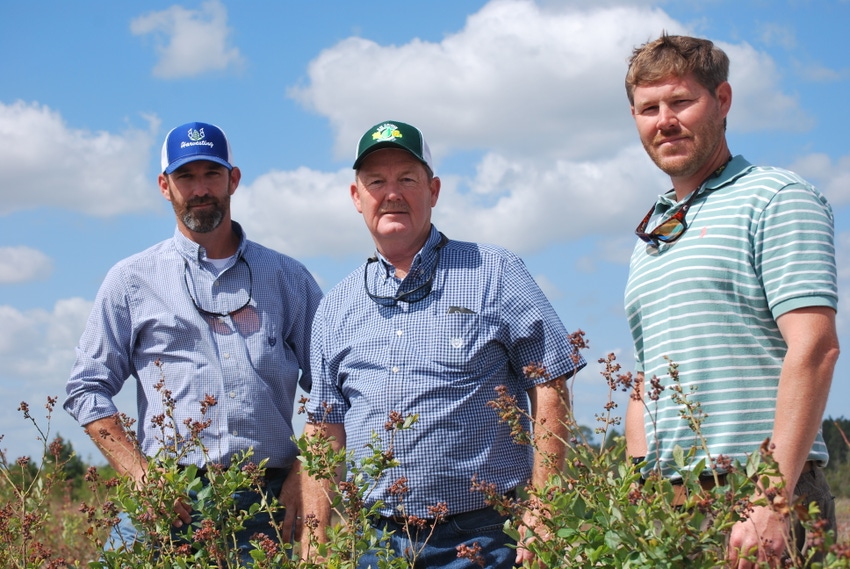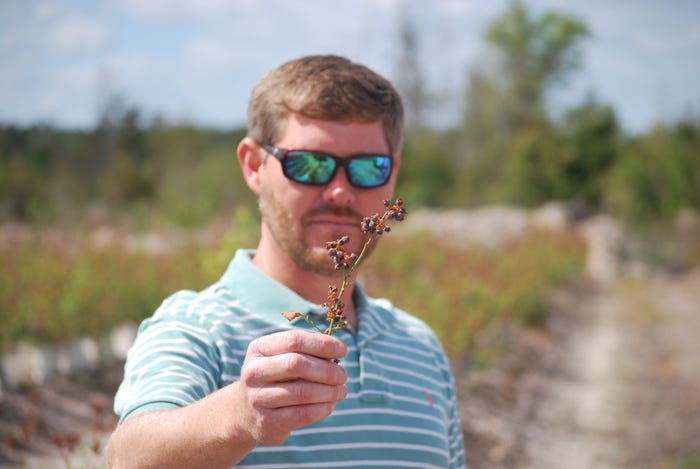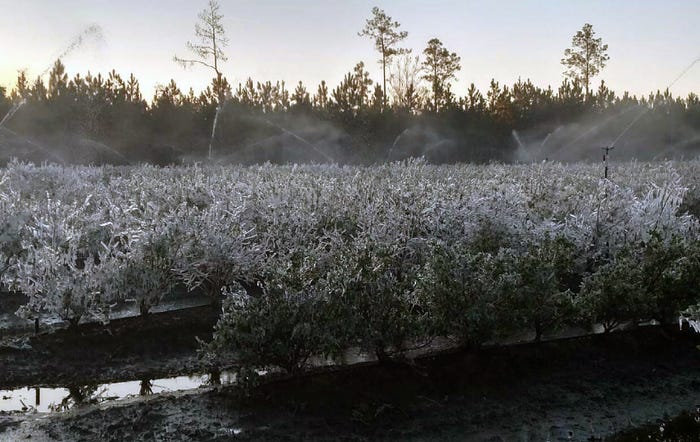
It’s March 24 and nearing 80 degrees. Mike, Michael and Chad Thomas stand in a blueberry orchard that on March 14 was loaded with a lot of ripening berries.
The berries were only two to three weeks away from harvest in this particular orchard, ahead of schedule by three weeks or more due to an unusually (even for south Georgia) warm winter. Father and sons look at the remaining shriveled berries and shrug, a total loss for this orchard. They’re not bitter or angry. They actually laugh and smile a good bit. A peaceful air and philosophical temper filters through their conversation, a response one can only have after knowing you did your best. But two weeks prior, the mood was more stressful.
On March 8 at the Thomas Family Blueberry Farm off Old Alma Road in Pierce County, Ga., the daytime temperature was in the mid-70s. But no matter what weather app you looked at or forecast you heard that day, it didn’t sound good: a hard freeze was expected to hit south Georgia in less than a week. “And that’s when we started getting concerned because the closer we got to the date they were saying, the forecast wasn’t changing. If anything, the forecast (temperature) was dropping,” Michael said.
The family kicked into gear, buying and gathering 150 round hay bales and about 165 square hay bales. And, most importantly, they checked the overhead irrigation where it was available on their orchards. They had berries to protect, and for the next week all efforts focused on that.
On Sunday, March 12, a family friend from Florida called and offered to bring three airboats to help the Thomases. The plan was to burn hay along the edges of orchards, pushing smoke through the bushes, something that had worked in the past to keep the air around the cold-sensitive berries above the critical freezing mark, Mike says. The airboats arrived a few days later and where put in place.
March 15 came. Mike, Chad and Jordan, Mike’s youngest son, readied and manned protective efforts in Pierce County, where the family has about 200 acres of mature commercial production. Michael was an hour south in Clinch County, overseeing protective efforts for the family’s 350 acres of blueberries there. Hay bales were lit to smolder. Overhead irrigation turned on. Subfreezing temperatures rushed into the area and the first long night began.
During early morning hours March 16, it looked like the smoke was going to work. But by dawn, it was obvious the smoke didn’t work in Pierce County, and they abandoned that cause. Despite best efforts of the airboats, temperatures dropped too low for too long. The atmosphere didn’t cooperate and the smoke didn’t settle in the right way to save the berries. By noon, the berries were already shriveling and falling off of the bushes.

Michael Thomas shows damage done by a hard freeze, which hit near-ripe blueberries March 15, 2017 in Pierce County, Ga., This orchard was a complete loss.
They hoped they were able to pump enough water with overhead irrigation to protect berries in other orchards. All of their blueberry orchards are irrigated with drip tape. But the Pierce County land only has about 25-30 acres with overhead sprinklers. Things promised to be better in Homerville, where the family has about 210 acres with overhead sprinklers, and that is where Michael remained pumping water at a rate of about 150 gallons per acre per minute in an effort to keep a layer of ice on the berries, a practice that can protect berries during a severe freeze. But this freeze wasn’t over.
March 16 overnight and March 17 early morning temperatures hit below freezing again. During that time, the Thomas family monitored what was that day, and what will be in the future, the most vital pieces of equipment on the entire operation: the hard-set, overhead sprinklers peering above the canopies. If the ice held just right on the berries, the berries might be saved.
By the morning of March 17, the family was weary. For 48-hours straight, they’d done what they could, catching sporadic naps in their trucks at the edges of their blueberry orchards. What they had hoped wouldn’t come this year of all years had come and it was bad. A major freeze had just kicked their crop. But by midday, the temperature had risen to 70 degrees with no more immediate threat of freeze. Some of their efforts to protect their berries worked. Some efforts didn’t work. It was time to try and get some rest, though sleep was fitful at first.
Of the 3.5 million pounds or so they’d hoped to harvest this year, they’ll feel blessed if they get half that when harvest completes later in spring and early summer at the locations in Pierce and Clinch counties. For the bushes that got zapped, they’ll continue to spray, nurture and keep them healthy. With some good pruning, those trees will grow better and stronger this summer and be ready for a bigger, better crop next year: a sliver of a silver lining.

The Thomas family is relatively new to blueberry farming. They were a timber-business family. In 2010, they started a five-year, family plan to ease out of timber and fulltime into blueberries. They don’t regret the move.
“The blueberry business is stressful at times, but the timber business is stressful every day, all day,” Mike said, adding that the family will continue to plant 50 to 60 new acres of blueberries each year.
James Jacobs, University of Georgia Extension coordinator in Pierce County, said the blueberry crop was going to be a strong one, maybe set records for some growers in the area. But the freeze took that potential away from all blueberry growers in the area.
“The Thomas family are good people and good blueberry growers. They did all they could do like all the growers in the area, and they can feel good about that. Where overhead irrigation was available and if they could keep enough water pumped long enough, I think we’re going to be OK and they (growers in the area) will have at least part of a crop,” said James later in the day March 24.
Some say the March 2017 freeze may prove to be the worst freeze, or most economically damaging freeze, to hit Georgia blueberries in decades if not ever. Either way March 2017 is now solidified into memory and will go down in lore for the country’s top blueberry-producing state.
In 2007, an Easter freeze did major damage to the crop. A late-spring freeze in 1997 was also disastrous. The Thomas family recognizes what appears to be the every-decade rhythm to these events, but they are not betting they have 10 years before the next big one hits. This one was too costly.
“I can promise you one thing: there will be more overhead sprinklers put in on this farm this year,” Mike said.
One tiny addendum to the story: As January rolled in a New Year, the entire Thomas blueberry-growing family from Pierce County, Ga., went on vacation, something they’ve never been able to do together before. Everyone was there: Mike and wife, Teri, along with Michael and Pamela and their three kids, and Chad and Melissa and their two kids, and Jordan and his wife, Holly. All was well with the family. And all was well back home on the farm as the blueberry bushes roused and the promise of a good 2017 harvest awakened.
Things didn’t turn out so well for the Thomas Family Blueberry Farm off Old Alma Road in Pierce County, Ga., in 2017. But all remains well for the Thomas family who grow blueberries together on it. They did all they could do.
About the Author(s)
You May Also Like






